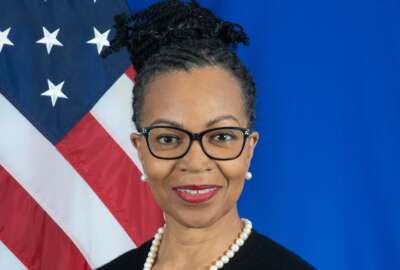

The State Department and the American Foreign Service Association added 71 names of the fallen this year to a memorial plaque in the lobby of the department’s...
The State Department celebrates Foreign Affairs Day each May as part of Public Service Recognition Week.
Former diplomats treat it as a kind of homecoming. But it’s also a solemn occasion to honor employees who have died in service of American Diplomacy.
The department and the American Foreign Service Association added 71 names of the fallen this year to a memorial plaque in the lobby of the department’s headquarters. The names span generations of federal service.
The C Street lobby of the State Department’s headquarters now bears the names of the 323 people who died in service of American diplomacy overseas.
Secretary of State Antony Blinken, in a May 7 speech, said the inscriptions serve as a solemn reminder.
“Every day, State Department employees walk past these names, and when we do, we take a minute to remember those who came before us, and what they gave for the American people,” Blinken said.
AFSA Vice President John Naland said the lobby plaques, following a recent expansion, have enough blank space to last another 50 years.
“Diplomacy is a dangerous occupation,” Naland said.
The plaques are paid for and maintained by AFSA, and so was the expansion. All of these marble tablets are hand-engraved by master stonemasons, the same people who handle CIA and military memorials – and graves at Arlington Cemetery.
AFSA President Eric Rubin said the inscribed names serve as a reminder about the dangers of serving overseas.
“Being in the Foreign Service has always been a perilous profession, and I think a lot of Americans have a misguided understanding of who diplomats are and what they do. There’s this image that they’re people in fancy clothes who go to cocktail parties and gossip and eat canapés and drink cocktails. For some people in the Foreign Service there may be a little of that, but actually most people are doing pretty tough duty in pretty tough places,” Rubin said.
AFSA approved a $50,000 project to expand its C Street Lobby plaques to honor those 71 overlooked colleagues as well as provide space for future inscriptions on the expectation that the sad toll of deaths of Foreign Service members in the line of duty will continue in the coming decades.
With the completion of this project in May 2021, the plaques now honor 323 fallen colleagues.
“The only thing left was the columns,” Naland said. AFSA added six single-column plaques to each of six columns in the lobby.
While this year’s ceremony honored deaths that largely predated the construction of the original 1933 memorial plaque, the department also honored two recent deaths of employees.
Nathan Lane, a Foreign Service officer who served in Vietnam, Russia, Mexico, Belarus and Kenya, died in a car accident while on temporary duty in Poland in 2019.
Another Foreign Service officer, Mark Mitchell, died in 2018 in a car accident in the Republic of Georgia, where he was last stationed. Prior to joining USAID, Mitchell served as an Army intelligence officer, and at the Federal Bureau of Prisons and Defense Intelligence Agency.
Several Foreign Service officers have submitted historical names for the record over the years. Jason Vorderstrasse, an FSO stationed in Hong Kong, discovered the grave of a U.S. diplomat whose name was not yet added to the memorial plaque.
Two other FSOs in the Bureau of Consular Affairs, Lindsay Henderson and Kelly Landry, gained access to department records, and went through thousands of index cards to track down the names of those who died at their post, and cross-referenced them with obituaries posted in online newspaper archives.
“It’s a very impressive piece of work and a wonderful gesture. They did this in their own spare time, because they cared, and felt that everybody should be honored,” Rubin said.
AFSA, in maintaining the plaques, has changed the criteria in recent years. Originally, the requirement was for employees who died under “heroic circumstances,” but the association in 2014 changed those standards to dying “in the line of duty.”
“Of course, it’s very hard to define what ‘heroic circumstances’ are, and there were always disagreements about whether a particular death qualified or not as heroic,” Rubin said.
Regardless of these standards, the job of a diplomat has become more dangerous in recent history. AFSA stood up a second plaque in 1972 to commemorate those who died during the Vietnam War. The wars in Iraq and Afghanistan, more recently, have added to the death toll.
“We have lost a significantly larger number of ambassadors serving their country overseas than we have lost generals and admirals. It has been much more dangerous to be an ambassador of the United States than it has to be a general or admiral,” Rubin said.
Acting Under Secretary for Management Carol Perez said the department is grateful to AFSA for the research and dedicated efforts that went into added these names to the C Street lobby.
“Advancing America’s interests and values is not without cost. We’re deeply indebted to the 323 colleagues whose names are inscribed on the memorial wall plaques, and we must strive to honor their service and sacrifice in all we do,” Perez said.
Copyright © 2025 Federal News Network. All rights reserved. This website is not intended for users located within the European Economic Area.
Jory Heckman is a reporter at Federal News Network covering U.S. Postal Service, IRS, big data and technology issues.
Follow @jheckmanWFED


